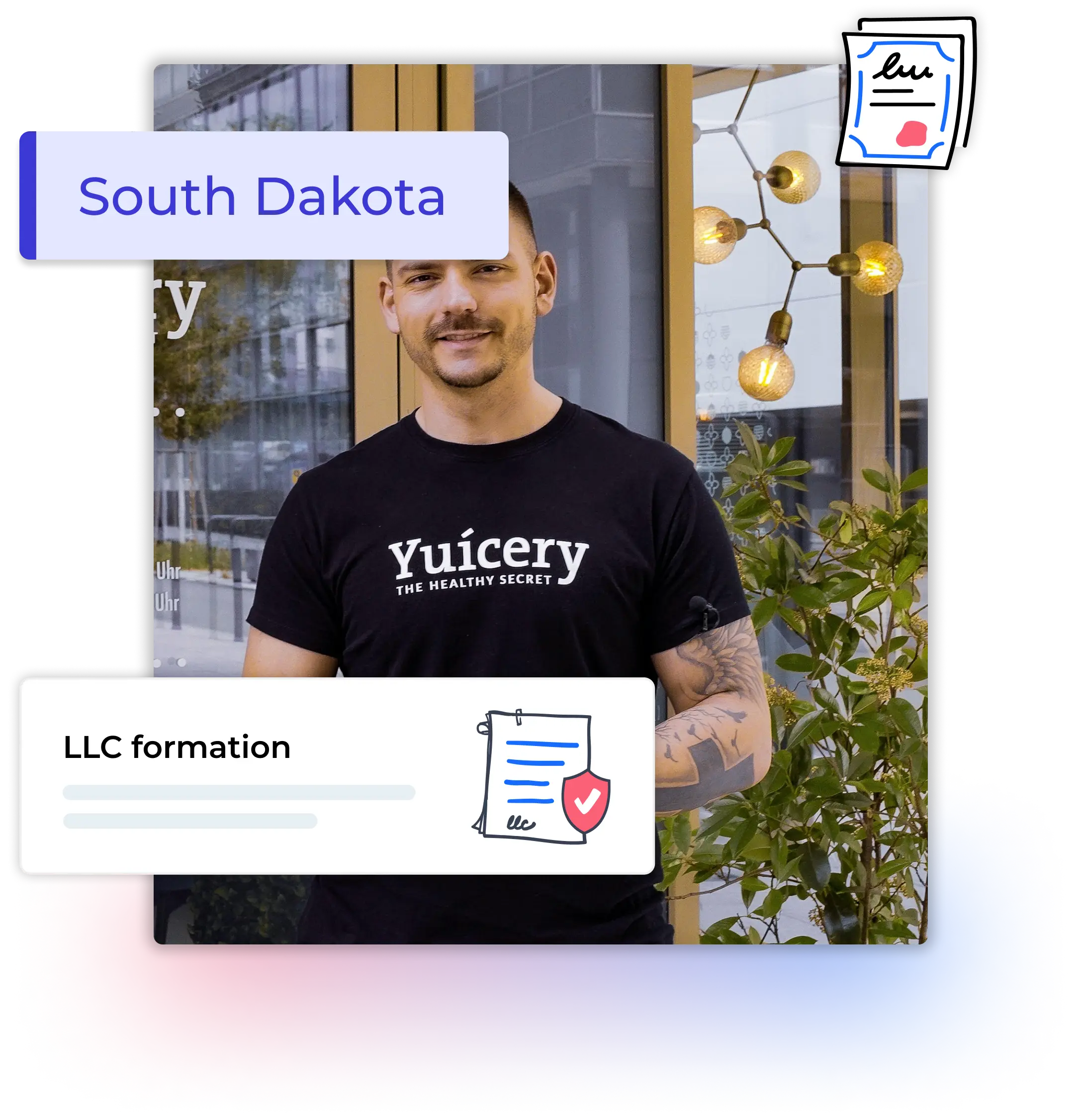Quick facts about forming an South Dakota LLC
| Filing Fee | $150 (online) or $165 (by mail) |
| Processing Time | Immediate to 1 business day online; up to 1-2 weeks by mail |
| Annual Report Fee | $50, due each year by the first anniversary month |
| Registered Agent Required | Yes, must have a physical South Dakota address |
| State Franchise Tax | None for LLCs |
| Business License | No statewide general license, but local licensing may be required |
| Managing Authority | South Dakota Secretary of State, Business Services Division |
How to start an LLC in South Dakota in 5 steps
Starting a business in South Dakota requires careful planning and preparation. You need to consider not only how your business will operate, but also how it will affect your own life and finances. By setting up an LLC, you can increase the odds of protecting yourself from personal liability for business debts. An LLC also gives you a framework for managing your business, distributing profits, and handling obligations such as taxes.
South Dakota presents numerous business incentives for LLCs. The South Dakota Governor’s Office of Economic Development offers several financing programs for new businesses. Other state programs can help with startup costs, employee recruitment, and other matters. South Dakota law gives LLCs great flexibility in terms of management. Perhaps most importantly, the state has no income tax for businesses.
Much of what you will need to form an LLC in South Dakota is available online. You will have to provide a fair amount of information about yourself and other members of your LLC, such as names, phone numbers, and addresses.
These are the five steps you must take to get your LLC in South Dakota:
- Name your South Dakota LLC
- Choose your registered agent
- File articles of organization
- Create an operating agreement
- Apply for an EIN
Detailed descriptions of each of these steps follow below as well as a helpful video:
Step 1: Name your South Dakota LLC
First, you will need to pick a name for your LLC. South Dakota has several requirements for LLC names. First, the name must contain one of the following:
- Limited Liability Company
- Ltd. Liability Company
- Limited Liability Co.
- Ltd. Liability Co.
- Limited Company
- Ltd. Co.
- L.L.C.
- LLC
- L.C.
- LC
Next, the name must be “distinguishable” from other names registered with the South Dakota Secretary of State (SDSOS). This includes the names of other LLCs, corporations, and partnerships, as well as reserved names and fictitious names used by foreign (meaning out-of-state) businesses registered in South Dakota. The SDSOS provides a tool on its website to conduct a South Dakota business entity search and see if a name is available or not.
South Dakota law makes 2 exceptions to the requirement that a business name must be distinguishable from all others. You may use a name for your LLC that is not distinguishable if:
- The current owner or registrant of the name consents in writing to your use of the name
- You have a court order granting you the right to use the name in South Dakota
Once you have found a name for your LLC, you must protect it to ensure no one else uses it first. You may do this by forming the LLC, but you may also have several other options such as reserving the name until you file the formation forms.
Step 2: Choose a registered agent
When you complete the articles of organization for your LLC, you must designate an individual or business to serve as the registered agent. They must have a street address, not a P.O. Box, that will serve as the LLC’s registered office.
The purpose of a registered agent South Dakota is to have someone who is always available during business hours to receive official correspondence and service of process. If someone sues your LLC, they must identify your registered agent as the person or business to receive service of process. The state may also send important information there. Your registered agent’s job is to forward these materials to you.
You may serve as the registered agent for your own LLC, or you can designate someone else to do it. Many lawyers and law firms, for example, act as registered agents for their clients, using their address as the registered office.
A registered agent service, such as Tailor Brands, will act as your registered agent for an annual fee. Using a third-party registered agent limits how often your name appears in the public record. It can also minimize the amount of material you receive at your office, since your address will not be listed alongside the name of your registered agent.
Step 3: File articles of organization
Once you have chosen your business name, you may be ready to form the LLC. You may do so by filing articles of organization with the SDSOS either online or by mail. The person who files the articles of organization is known as the “organizer.”
State fees
The SDSOS charges a $150 filing fee to file articles of organization for an LLC online. The fee if you file a paper document, by mail or in person, is $165. This is the primary South Dakota LLC formation cost you’ll need to budget for when starting your business.
Requirements
You will need the following information to file articles of organization:
- The primary business address of the LLC, which cannot be a P.O. Box
- The name of the registered agent for the LLC
- The registered office address, which also cannot be a P.O. Box
- The name and address of each organizer
- The duration of the LLC, if not perpetual
- Whether the LLC will be managed by its members or by managers appointed by the members
- The names and addresses of the LLC’s members
How to file
You may file the articles of organization online at the SDSOS website. If you prefer to file the old-fashioned way, you must fill out Form SDCL 47-34A-203, 212, Articles of Organization: Domestic Limited Liability Company. You can send or deliver the form to the Secretary of State’s Office, 500 E. Capitol Avenue, Pierre, SD 57501.
Step 4: Create an operating agreement
An operating agreement is a contract between members of an LLC that establishes policies and procedures for how to manage their business. You can use it to create formal processes for matters like:
- Voting on major decisions
- Distributing profits
- Allocating losses
- Appointing managers to run the business
- Selling or transferring membership interests
- Selling business assets
- Winding down and dissolving the business
Even if you are the only member of the LLC, a South Dakota LLC operating agreement can help you maintain the formality often expected from a business. It can give you additional credibility with creditors, vendors, and others. It can also help maintain liability protection for you individually.
Is an operating agreement a must?
South Dakota does not require the members of an LLC to create an operating agreement. In the absence of an operating agreement, state law governs an LLC’s operations.
State law does, however, identify what an operating agreement cannot do, including:
- Eliminate a member’s duty of loyalty to the LLC
- Eliminate a member’s duty to the LLC of good faith and fair dealing
- Modify the LLC’s right to expel a member for wrongful conduct that harmed the company
- Change the obligation under state law to wind up the business after certain events occur
- Restrict the rights of anyone who is not a member, manager, or recipient of a manager’s right to receive profits from the LLC
Step 5: Get an EIN
Once you have formed your LLC, you will need to obtain an Employer Identification Number (EIN) from the IRS. This number serves a similar purpose as a Social Security number. You will use it on federal tax documents but also for other purposes such as opening a bank account and applying for a business loan. Tailor Brands can help you obtain an EIN, or you can do it yourself.
If you are located in South Dakota, you may apply for an EIN online, by fax, or by mail. You will need information including the business name and address, your name, the type of business, and the reason you are applying for an EIN. You may choose “started a new business” for this item.
You can apply online at the IRS website. If you use this option, you should have your EIN within a few minutes.
To apply for an EIN by fax or mail, you must fill out Form SS-4. Several items on the form can be difficult to understand. Lines 8a through 8c ask about whether your business is an LLC. Line 9a then asks about the type of entity, but it does not include “LLC” as an option. The answer may depend on the type of tax treatment you have chosen for the LLC, which is discussed in more detail below. In short, the IRS will treat an LLC like a partnership for tax purposes by default, but you can elect to have the IRS treat it like a corporation.
You can fax the form to (855) 641-6935. You should receive your EIN within a few days, up to a week. You can mail the form to Internal Revenue Service, Attn: EIN Operation, Cincinnati, OH 45999. The IRS states that it takes 4 weeks to get your EIN this way.
Once you’ve obtained your EIN, your LLC is officially set up and ready to operate. But remember, formation is only the beginning. Each year, you’ll also need to file a South Dakota LLC annual report to keep your company in good standing with the state.
FAQ
It costs $150 to file your Articles of Organization online or $165 by mail.
Online filings are typically approved immediately or within one business day, while mailed filings can take one to two weeks.
Yes, every LLC must appoint a registered agent with a physical address in South Dakota.
South Dakota does not require an operating agreement, but creating one is recommended to clarify ownership and management terms.
Yes, all LLCs must file an annual report each year by the first anniversary month and pay a $50 fee.
South Dakota does not charge a franchise tax, and it does not impose state income tax on individuals or LLCs.
South Dakota does not require a statewide business license, but local governments and certain industries may require permits or registrations.
You can dissolve a South Dakota LLC by filing Articles of Termination online or by mail and paying the $10 filing fee.




